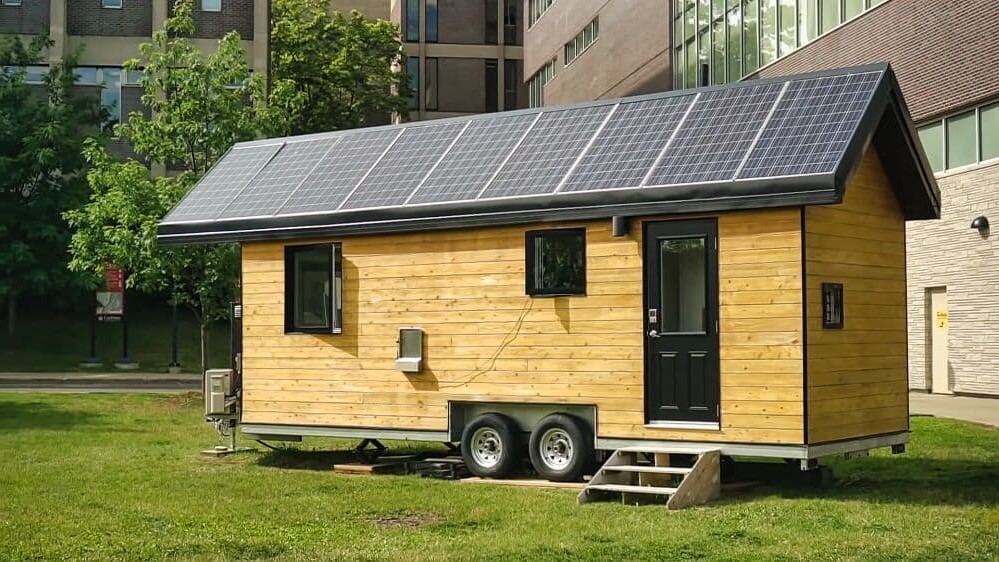Harnessing solar energy has been a goal of scientists for centuries, and Man used it to light fires as long ago as 7000 B.C. Archimedes, the Greek scientist, used the reflected heat of the sun to burn the wooden ships of invading Romans. But solar panels generating electrical power in homes is a very recent development, and its use in mobile homes is even more recent. How feasible is this, and what are the benefits?
Solar panels on mobile homes are feasible and are increasingly prevalent as they become more affordable. The benefits include cost saving, which results in the panels being paid off in six to ten years, and the practical advantages of being “off-grid” in a mobile home.
Electricity is becoming an expensive and less reliable commodity, with supply being affected by weather conditions in two-thirds of the country. These are good reasons to look at alternative sources of electricity, and solar panels are one option. If you own a mobile home, several unique factors will affect your decision. This article will give you all the information you need to make the right choice. (Related article: Maximizing Solar Energy: Is Your Home Suitable for Solar?)
The Feasibility and Benefits of Solar Panels on Mobile Homes
Firstly, I'd like to define the term mobile home: is it a trailer home, an RV, or a motorhome? Can it be relocated, and how does it differ from a manufactured home?

What is a Mobile Home – A Brief History and Definition
The first thing to get straight is that the term “mobile home” only applies to homes made before June 1976. Any houses built after this date should be called "manufactured homes" under the Housing Act of 1980. In practical terms, though, most Americans find mobile home the easiest way to describe this type of house and continue to use the term. You’ll find both terms being used in this article.
There’s more to this than just a name. The Department of Housing and Urban Development provided the Manufactured Home Construction and Safety Standards – known as the HUD code – that stipulates what should be incorporated into manufactured houses regarding:
Today’s manufactured homes are a huge improvement on the mobile homes of yesteryear but still cost much less than a traditional site-built house. They have become more sophisticated and are built in purpose-designed factories before being placed on a piece of land, either privately owned or part of a mobile home park.
A manufactured home can be relocated, but this is seldom done, and 90% of mobile/manufactured homes remain in their original position.
HUD standards for manufactured homes were significantly upgraded in 1994. So, regarding quality, existing houses can be divided into three time periods—pre-1976, 1976–1994, and post-1994.
Can You Put Solar Panels on a Mobile or Manufactured Home?
As I have outlined above, in common use the terms “mobile home” and “manufactured home” are interchangeable, but in legal and official documents, the former applies to prefabricated homes built before June 1976, and the latter to those built after that date.
Using those legal definitions, it is generally the case that mobile homes had roofs that were too shallow-pitched and not sturdy enough to carry the weight of solar panels. From 1976, and even more so from 1994, the manufactured homes were designed with much stronger roofs and it was feasible to retrofit them with roof-mounted solar panels.
How Do Solar Panels Work?
We all know what they look like, but how do they work? Simply put, a solar panel converts photons, pockets of energy derived from sunlight, into electricity using photovoltaic cells. These cells, made of silicon or other semiconductor materials, generate electrons when exposed to light. The electrons produce direct current electricity, which can be stored in batteries or used to power the home.
Benefits of Solar Panels for Owners of Manufactured Homes
Most mobile or manufactured homes are owned by people with limited finances, so monthly expenses take up most of their disposable income. Solar panels can offer these owners benefits that have been described as life-changing.
Energy Independence
Generating your own power and getting fully or even partially off the state electrical grid means not having to worry about price increases or the outages that are becoming more common.
Cost Savings
Solar panels aren’t free, but the power they produce is, so over a period, the savings are significant, and over time, the purchase and installation costs will be recovered. Also, there are tax rebates and incentives that vary from state to state, which will reduce monthly expenses even further.
Enhanced Property Value
The fact that the running costs of a solar-powered home are substantially lower than a conventional one gives it added value and makes it more attractive to potential buyers.
Environmentally Friendly
Using a sustainable, free energy source to run the home is a small but significant contribution to a “green” environment. However, it is countered by the negative impact of the production process in the manufacture of solar panels.
The Feasibility of Solar Panels on Mobile Homes
It is feasible and being done in increasing numbers, but equipping mobile homes with solar power has unique challenges. These, broadly speaking, are, firstly, financial and, secondly, physical difficulties that need to be overcome.
Financial Problems In Putting Solar Panels On Mobile Homes:
Physical Limitations In Putting Solar Panels On Mobile Homes:
Rooftop solar panels are often not an option for mobile homes, particularly those manufactured before 1994 when the HUD code upgraded the minimum specifications for these houses.
Ensuring the Feasibility of Solar Panels for Mobile Homes
Despite the unique problems faced by the owners of mobile homes, installing solar panels is still a feasible way of cutting the cost of electricity and reducing monthly expenses.
Final Thoughts
Manufactured homes are less energy-efficient than traditional-built homes, but being smaller on average, use less electricity. Installing solar panels to generate power is not only possible but can help to reduce electricity usage even further, bringing substantial cost savings and paying for themselves within six to ten years.
Overcoming the financial and physical problems is not only feasible but brings life-changing rewards. (Related article: Solar Power For Homes: Is It Worth The Investment?)

